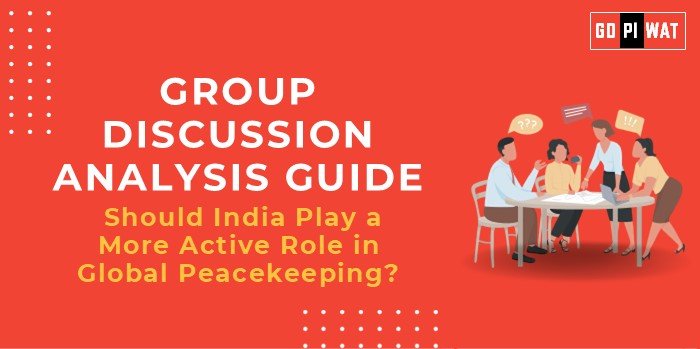📋 Group Discussion Analysis Guide
🌐 Should India Play a More Active Role in Global Peacekeeping?
🌍 Introduction
India, renowned for its commitment to global peace and stability, has a rich history in United Nations (UN) peacekeeping operations. As the third-largest troop contributor in 2023, India’s involvement has been crucial in maintaining global peace and fostering international goodwill. The debate centers on whether India should take on an even more proactive role in these efforts.
📊 Quick Facts & Key Statistics
- 🌐 UN Peacekeeping Missions: Participated in 49 missions since inception.
- 🪖 Troop Contributions: Over 200,000 troops and numerous police personnel deployed historically.
- 📈 Current Participation: Ranked third globally with 6,089 uniformed personnel as of May 2023.
- 💰 Budgetary Contributions: $32.9 million paid in 2024, supporting UN peacekeeping and other functions.
- 🕊️ Global Recognition: Over 160 Indian peacekeepers have sacrificed their lives in service, reflecting India’s commitment.
🤝 Stakeholders and Their Roles
- 🏛️ Government of India: Allocates resources and determines strategic participation.
- 🌐 United Nations: Manages peacekeeping operations and deploys Indian forces.
- 🛡️ Indian Armed Forces and Police: Execute missions and provide humanitarian aid.
- 🏳️ Host Nations: Benefit from India’s expertise and humanitarian efforts.
📈 Achievements and Challenges
🏆 Achievements:
- ✔️ Operational Contributions: Effective participation in 49 missions, showcasing military discipline and professionalism.
- 👩🚒 Gender Inclusivity: India deployed the first all-female Formed Police Unit in Liberia, inspiring global recognition.
- 🏗️ Humanitarian Support: Indian forces are known for rebuilding infrastructure and providing medical aid.
⚠️ Challenges:
- ❌ Casualties: Over 160 Indian personnel have lost their lives, reflecting high risks.
- 📉 Strategic Limitations: Limited influence in decision-making at the UN Security Council.
- 💼 Resource Allocation: Balancing peacekeeping with domestic security demands.
🌏 Global Comparisons:
- 🇨🇳 China: Expands its influence through active peacekeeping and financial contributions.
- 🇷🇼 Rwanda: A smaller nation with significant contributions relative to its size.
📚 Case Study:
Liberia’s Peacebuilding: India’s Formed Police Unit enhanced security, promoted gender equality, and improved global perceptions.
🗣️ Effective Discussion Approaches
💬 Opening Approaches:
- 📊 Highlight India’s rank and historical contributions to peacekeeping.
- 📰 Discuss a recent conflict where Indian peacekeepers played a vital role.
- 🌏 Use global comparisons to underscore India’s unique positioning.
🤔 Counter-Argument Handling:
- 🛡️ Acknowledge domestic priorities and suggest balanced strategies.
- 💡 Address resource concerns by highlighting India’s efficient contributions.
📌 Strategic Analysis of Strengths & Weaknesses
✅ Strengths:
- ✔️ Largest historical contributor to UN peacekeeping.
- 📋 High operational efficiency and discipline.
❌ Weaknesses:
- 📉 Limited UNSC influence.
- ⚠️ Risks of overextending resources.
🌟 Opportunities:
- 🔍 Strengthen claims for UNSC permanent membership.
- 🤝 Build leadership roles in peacekeeping missions.
⚠️ Threats:
- ⚔️ Casualties in high-risk zones.
- 💼 Resource competition between domestic and international commitments.
📚 Structured Arguments for Discussion
- 🟢 Supporting Stance: “India’s active peacekeeping reinforces its claim for a permanent UNSC seat and elevates its global stature.”
- 🔴 Opposing Stance: “Expanding peacekeeping commitments may strain resources needed for domestic priorities.”
- ⚖️ Balanced Perspective: “India can enhance its role in peacekeeping while ensuring domestic stability through strategic partnerships and resource optimization.”
🎓 Connecting with B-School Applications
📖 Real-World Applications:
- 🌍 Geopolitical analysis for academic projects.
- 💼 Leadership lessons from peacekeeping operations for internships.
❓ Sample Interview Questions:
- 💬 “How do India’s peacekeeping contributions reflect its foreign policy priorities?”
- 🧐 “What are the strategic benefits and challenges of India’s expanded global role?”
💡 Insights for B-School Students:
- 📘 Focus on decision-making and conflict resolution.
- 🔍 Explore the nexus between global leadership and resource management.


